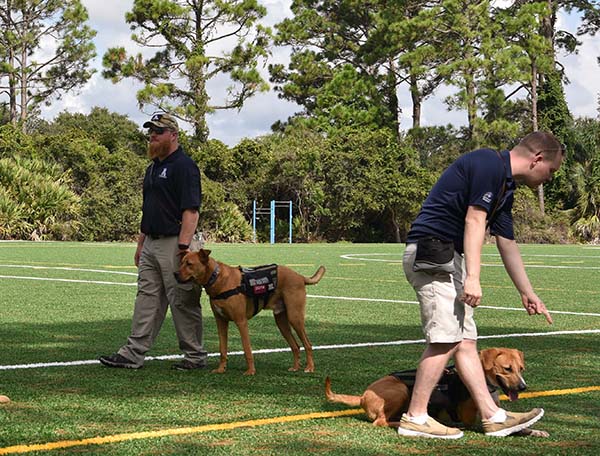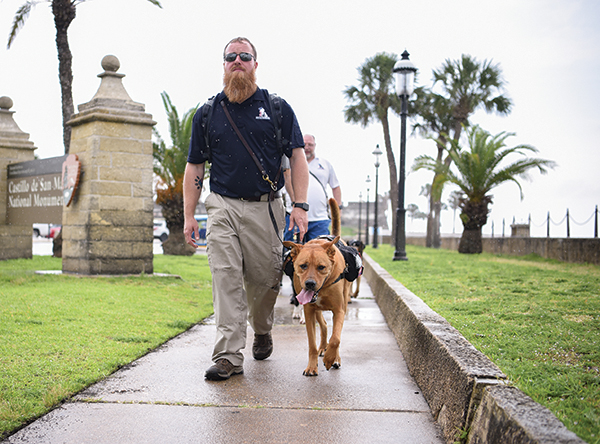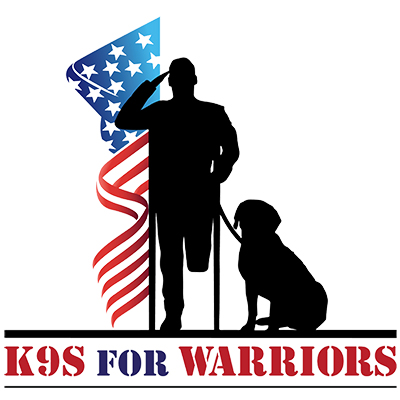
There’s a good chance that any veteran, or anyone involved with the military and veteran communities, has heard of service dogs. There’s near certainty they’ve heard of PTSD. There’s a growing movement to make those topics become synonymous with one another – the idea that service dogs help PTSD.
James Rutland knows both so well that it can be said he lives them both. Rutland is an Army veteran who served for 12 years, from 2002-2014. His career included a deployment to Baghdad, Iraq in support of OIF phases II and III. He was there from January ’04 – ’05, assigned to a combat support hospital as a Wheeled Vehicle Mechanic. He also deployed to Korea two different times, from ’06 – ’07 and ’09 – ‘12.
Rutland remembers the day when his life dramatically altered.
“On April 10th, 2004, I got blown-up. Then my whole world turned upside down. I didn’t know what was going on. I didn’t want to sleep anymore. I wanted to do everything that you’re supposed to do, but not stop. That’s how I knew something I was wrong.”
What Rutland is describing is the onset of his battle with PTSD, which started taking over his life, both in the Army and at home.
“I was afraid to take leave because I felt if I took leave, somebody would die, and who would take care of things if I were gone? That’s where my head space was. I knew it wasn’t true, but that’s how your brain works over there. I didn’t even want to go home because by that point, my home life was wrecked.
In any situation, I was an aggressive leader. I wasn’t compassionate. Whenever I was present, I took charge no matter who was there. I felt like if I wasn’t running the show, it wasn’t going to happen right. I was focusing so hard on work to try to hide all the hurt.”
Rutland’s life continued like this for the rest of his time in service. When he was medically retired, he retreated to a world of isolation, unsure of how to navigate the return to a civilian role.
As often happens with service members who go through such trials, Rutland also struggled with substance abuse during his darker days. After being discharged fromthe Army, he isolated himself in an area of his parents’ home, and, as he put, “lived by the bottle – whether it be a pill or a liquor bottle. I had everything there that I needed. I wouldn’t leave for days.”
During those dark, isolated days, he even went so far as to do the unthinkable: Rutland made a plan to take his own life by suicide.
Those who cared about Rutland weren’t standing for losing him. They kept encouraging him to get help the best way they knew how. Rutland said their words resonated in his head and heart, and he began listening.
“Something had to change. I had enough people who loved me to force the change. They wanted me back.”
In early 2015, Rutland’s mother contacted Jeannie Blaylock, a Northeast Florida news anchorwoman and avid supporter of the national veterans’ service organization, K9s For Warriors.

K9s For Warriors is a nonprofit that has been saving veterans by pairing them with service dogs since 2011. The organization’s mission is to rescue shelter dogs and turn them into highly trained service dogs to help post-9/11 veterans suffering from PTSD, Traumatic Brain Injury, Military Sexual Trauma, and the thought that those traumas often lead to: suicide.
The service dog organization trains a new class of veterans each month in a peer-to-peer setting that gives veterans back the sense of camaraderie they used to have on active duty, something they miss greatly when they make the transition back to civilian life. Not only do they go through the training with fellow veterans, but those who train the classes are also military veterans and graduates of K9s For Warriors themselves.
Blaylock took Rutland for a tour of Camp K9, being sure a service dog was what James needed. She was right. After speaking with multiple K9s staff members and seeing the training facility, Rutland applied. In April 2016, Rutland arrived for class, ready to meet his new prescription on four legs: a large, shelter-turned-service dog named Dunkin.
“As we spent time together, Dunkin became part of my daily routine. He helped me get me up every day. I started to put my trust in him, that he knew what was best for me in the moment. If he pawed at me or nuzzled me, I paid attention.”
After graduating and returning home with Dunkin, Rutland was improving, but still wanted more for his life. As his bond with Dunkin grew, so did his aspirations.
“I called K9s and asked if there was anything I could do to be involved. They brought me back for an interview and told me they were looking to hire more warrior trainers. I immediately said, ‘I’ll do it’.”
So, Rutland returned to Camp K9 in 2017 to enter the Warrior Trainer Apprenticeship program. After six months of in-depth instruction on all warrior training, service dog training and kennel procedures, he graduated once again, but this time, as a warrior trainer. Now, like the program graduates who once led him through the program, Rutland gives guidance and hope to fellow veterans with PTSD who, like himself, used to feel hopeless.
“Taking the focus off myself and putting it on someone else – Dunkin included – is what really helped my own healing. Helping other veterans by training them with their service dogs helps me. If you’re helping others start a new path in their life, you’re too busy to regress in your own life.
“Dunkin provides me a sense of purpose and is a silent sounding board. He listens to all my crap and doesn’t judge me. I can look him in the face and tell him everything I’m thinking, and then I’m over it, and he won’t tell anyone what I said. He also gives me unconditional love. I receive so much from him. I feel like he’s smarter than I am.”
Rutland continues to help other veterans find the same healing from PTSD with a service dog as a warrior trainer with K9s For Warriors at its two Florida
training locations.
“This program gives me a daily purpose, to have a positive impact on others. With every warrior that is helped, that’s one more off the [suicide] list. I can train warriors and help give the dogs a purpose. That is what’s most important to me.”
To find out more about K9s For Warriors, including how to apply for a service dog, or how to become a Guard Dog by donating, visit www.K9sForWarriors.org.
As of August 2019, K9s For Warriors has graduated 558 warriors and rescued over 1,000 dogs. K9s For Warriors helps both veterans and their service canines find a new “leash” on life: we save the dog, and the dog saves the veteran.





